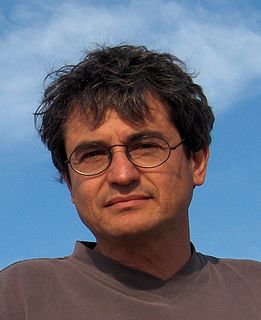A Quote by Lawrence M. Krauss
If we wish to draw philosophical conclusions about our own existence, our significance, and the significance of the universe itself, our conclusions should be based on empirical knowledge. A truly open mind means forcing our imaginations to conform to the evidence of reality, and not vice versa, whether or not we like the implications.
Related Quotes
A myth is a way of making sense in a senseless world. Myths are narrative patterns that give significance to our existence. Whether the meaning of existence is only what we put into life by our own individual fortitude, as Sartre would hold, or whether there is a meaning we need to discover, as Kierkegaard would state, the result is the same: myths are our way of finding this meaning and significance.
The correctness of any of our policies has always to be tested and is always being tested by the masses themselves. We ourselves constantly examine our own decisions and policies. We correct our mistakes whenever we find them. We draw conclusions from all positive and negative experiences and apply those conclusions as widely as possible. In these ways relations between the Communist party and the masses of the people are constantly being improved.
The very foundation of science is to keep the door open to doubt. Precisely because we keep questioning everything, especially our own premises, we are always ready to improve our knowledge. Therefore a good scientist is never ‘certain’. Lack of certainty is precisely what makes conclusions more reliable than the conclusions of those who are certain: because the good scientist will be ready to shift to a different point of view if better elements of evidence, or novel arguments emerge. Therefore certainty is not only something of no use, but is in fact damaging, if we value reliability.
It is generally believed that our science is empirical and that we draw our concepts and our mathematical constructs from the empirical data. If this were the whole truth, we should, when entering into a new field, introduce only such quantities as can directly be observed, and formulate natural laws only by means of these quantities.
..all arguments concerning existence are founded on the relation of cause and effect; that our knowledge of that relation is derived entirely from experience; and all our experimental conclusions proceed upon the supposition that the future will be conformable to the past. .... Without the influence of custom, we should be entirely ignorant of every matter of fact beyond what is immediately present to the memory and senses.
Every person needs to feel significant. We want our lives to count. We yearn to believe that in some way we are important and that hunger for significance-a drive as intense as our need for oxygen-doesn't come from pride or ego. It comes from God because he wants each of us to understand how important we are. ... We must seek our roots, our origin, and our destiny so that we can know our present value. ..... ...We can help each other realize that we are persons of significance being made in the image of God.



































